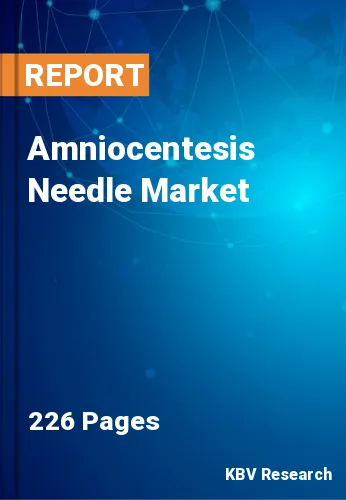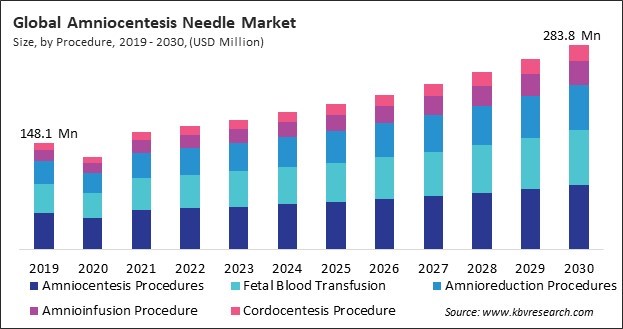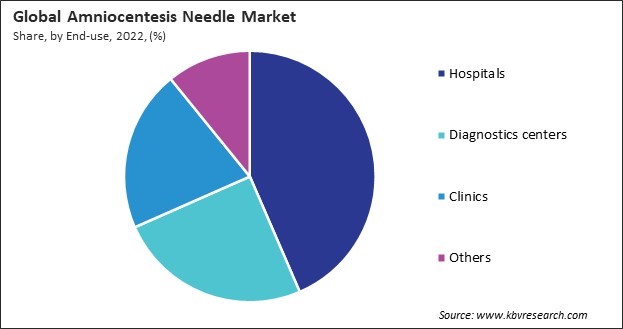
The Global Amniocentesis Needle Market size is expected to reach $283.8 million by 2030, rising at a market growth of 6.7% CAGR during the forecast period.
As awareness of prenatal care and genetic testing grows and healthcare infrastructure improves, an increasing number of pregnant females in the Asia Pacific region are requesting access to advanced prenatal diagnostic services, such as amniocentesis. Consequently, the Asia pacific region would acquire nearly 28% of the total market share by 2030. Improved access to healthcare facilities and prenatal care services enables individuals to undergo comprehensive prenatal screening and diagnostic procedures to assess fetal health and detect genetic abnormalities.

Genetic disorders are becoming more prevalent due to various factors, including environmental factors, lifestyle changes, and increased exposure to mutagens. Moreover, advances in medical technology have made amniocentesis procedures safer, more accurate, and less invasive, thereby increasing its acceptance among pregnant individuals. Therefore, the rising incidence of genetic disorders is driving the growth of the market. Additionally, Government initiatives often aim to make prenatal screening and diagnostic procedures more accessible and affordable to pregnant individuals. Furthermore, governments often regulate the healthcare industry to ensure the safety and efficacy of medical devices and procedures. Therefore, increasing government initiatives and policies are driving the market's growth.
Moreover, during the height of the pandemic, many healthcare facilities faced disruptions in their normal operations. Non-urgent medical procedures, including some prenatal diagnostic tests like amniocentesis, were postponed or canceled to prioritize resources for COVID-19 patients. However, the market exhibited resilience and adaptability in the face of the obstacles presented by the pandemic. Manufacturers and healthcare providers implemented innovative solutions to address supply chain disruptions, enhance safety protocols, and prioritize patient care. Thus, the COVID-19 pandemic moderately impacted the market.
However, to acquire an amniotic fluid sample for genetic testing, amniocentesis requires the insertion of a catheter through the lining of the abdomen and into the amniotic sac. Moreover, amniocentesis carries a risk of infection, albeit low, due to the introduction of a foreign object (the needle) into the amniotic sac. Therefore, the risk of procedure-related complications is hampering the growth of the market.
 Drivers
Drivers  Restraints
Restraints  Opportunities
Opportunities  Challenges
Challenges On the basis of procedure, the market is segmented into amniocentesis procedures, amnioreduction procedures, fetal blood transfusion, amnioinfusion procedures, and cordocentesis procedure. In 2022, the fetal blood transfusion segment attained 27% revenue share in the market. Fetal anemia, distinguished by an inadequate quantity of red blood cells in the fetus, may arise from many causes, including alloimmune disorders or genetic anomalies. The incidence of fetal anemia may be increasing due to factors such as changes in maternal-fetal blood group incompatibilities, maternal health conditions, and environmental factors, driving the need for fetal blood transfusions.
Based on end-use, the market is categorized into hospitals, diagnostics centers, clinics, and others. The clinics segment witnessed a 20% revenue share in the market in 2022. Clinics, especially those specializing in women's health and reproductive medicine, provide accessible and convenient healthcare services for pregnant individuals seeking prenatal screening and diagnostic procedures, including amniocentesis. Most clinics are often located in community settings, making them easily accessible to patients seeking comprehensive prenatal care.

Based on type, the market is divided into 100 to 150 mm, smaller than 100 mm, and larger than 150 mm. The smaller than 100 mm segment attained a 18% revenue share in the market in 2022. and tissue damage associated with larger needle sizes. Smaller needles enhance procedural safety and reduce the likelihood of adverse events during amniocentesis procedures by minimizing tissue trauma and needle deflection, improving patient outcomes and procedural success rates.
Free Valuable Insights: Global Amniocentesis Needle Market size to reach USD 283.8 Million by 2030
Region-wise, the market is analyzed across North America, Europe, Asia Pacific, and LAMEA. The North America region witnessed 35% revenue share in the market in 2022. North America has witnessed a trend of increasing maternal age, with more women choosing to delay childbirth until later in life. Increased maternal age is correlated with a heightened likelihood of chromosomal defects and genetic disorders developing in fetuses; consequently, prenatal diagnostic procedures, including amniocentesis, are in greater demand as they evaluate the health and genetic status of the fetus.
| Report Attribute | Details |
|---|---|
| Market size value in 2022 | USD 171 Million |
| Market size forecast in 2030 | USD 283.8 Million |
| Base Year | 2022 |
| Historical Period | 2019 to 2021 |
| Forecast Period | 2023 to 2030 |
| Revenue Growth Rate | CAGR of 6.7% from 2023 to 2030 |
| Number of Pages | 226 |
| Number of Tables | 378 |
| Report coverage | Market Trends, Revenue Estimation and Forecast, Segmentation Analysis, Regional and Country Breakdown, Porter’s 5 Forces Analysis, Company Profiling, Companies Strategic Developments, SWOT Analysis, Winning Imperatives |
| Segments covered | Procedure, Type, End-Use, Region |
| Country scope |
|
| Companies Included | BIOPSYBELL S.R.L., Cook Medical, Inc. (Cook Group), Ri.Mos. Srl, CooperSurgical, Inc. (The Cooper Companies, Inc.), Rocket Medical plc (Röko AB), Argon Medical Devices, Inc. (SHANDONG WEIGAO GROUP MEDICAL POLYMER COMPANY LIMITED), Moller Medical GmbH (Centrotec SE) and Becton, Dickinson and Company |
By Procedure
By End-use
By Type
By Geography
This Market size is expected to reach $283.8 million by 2030.
Rising incidence of genetic disorders are driving the Market in coming years, however, Risk of procedure-related complications restraints the growth of the Market.
BIOPSYBELL S.R.L., Cook Medical, Inc. (Cook Group), Ri.Mos. Srl, CooperSurgical, Inc. (The Cooper Companies, Inc.), Rocket Medical plc (Röko AB), Argon Medical Devices, Inc. (SHANDONG WEIGAO GROUP MEDICAL POLYMER COMPANY LIMITED), Moller Medical GmbH (Centrotec SE) and Becton, Dickinson and Company
The expected CAGR of this Market is 6.7% from 2023 to 2030.
The Hospitals segment led the Market, by End-use in 2022; thereby, achieving a market value of $118 million by 2030.
The North America region dominated the Market, by Region in 2022, and would continue to be a dominant market till 2030; thereby, achieving a market value of $95.7 million by 2030.
Our team of dedicated experts can provide you with attractive expansion opportunities for your business.
